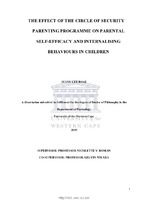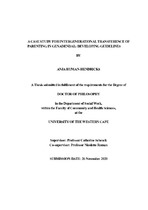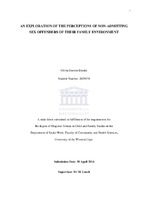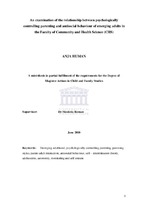| dc.contributor.advisor | Roman, Nicolette V. | |
| dc.contributor.advisor | Mwaba, Kelvin | |
| dc.contributor.author | Rose, Jenny Lee | |
| dc.date.accessioned | 2020-12-02T11:58:43Z | |
| dc.date.available | 2020-12-02T11:58:43Z | |
| dc.date.issued | 2019 | |
| dc.identifier.uri | http://hdl.handle.net/11394/7641 | |
| dc.description | Philosophiae Doctor - PhD | en_US |
| dc.description.abstract | Early Childhood development is an important phase of development, wherein the trajectory of
the child’s life can potentially be determined. However, not all children experience positive
outcomes, and many present with psychopathology. In particular, psychopathology in children
will manifest as either externalizing behaviours or internalising behaviours. The treatment of
internalising disorders becomes increasingly complex, as there isn’t always outward behaviour
to give evidence to the inward difficulties. Literature amplifies the importance of the role of
the parent in ensuring the well-being of the child and in working towards healthy
developmental outcomes. | en_US |
| dc.language.iso | en | en_US |
| dc.publisher | University of Western Cape | en_US |
| dc.subject | Early childhood development | en_US |
| dc.subject | The circle of security parenting programme (COS-P) | en_US |
| dc.subject | Parenting | en_US |
| dc.subject | Parenting programme | en_US |
| dc.subject | Parental self-efficacy | en_US |
| dc.title | The effect of the circle of security parenting programme on parental self-efficacy and internalising behaviours in children | en_US |
| dc.rights.holder | University of Western Cape | en_US |




